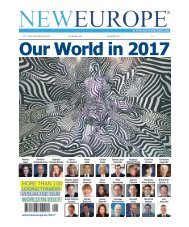Our World in 2018
Leading minds reflect on the state of our societies, and examine the challenges that lie ahead. An edition dedicated to generating ideas that will help form a new vision for our world.
Leading minds reflect on the state of our societies, and examine the challenges that lie ahead. An edition dedicated to generating ideas that will help form a new vision for our world.
Create successful ePaper yourself
Turn your PDF publications into a flip-book with our unique Google optimized e-Paper software.
SCIENCE & TECHNOLOGY
Tackling ‘digital’ at the
state level in a post-
DSM world?
By Krzysztof Szubert
As the year 2018 sets in, it’s a
are at building the Digital Single
Market and unlocking barriers for Europe’s
digital growth.
A number of proposed DSM-based
initiatives have already been adopted, while
others are still subject to negotiations. In
C
opening of publicly funded data and data
sharing, combating platforms-to-business
unfair practices, tackling illegal content
online, addressing the topic of boosting
disinformation.
However, while keeping up the work on
all the proposals on the table, we should
also take a closer look at the big picture.
We live in a world where almost every
aspect of daily and business life has a digital
component to it. This process is gathering
pace, and we will rely on digital technologies
even more in the future. To make full use
face derailing challenges that come our way
head-on at full speed.
We need to realise that we are dealing
with a complete alteration of the global
economy. Digitalisation has changed
the way businesses operate, states are
governed and the way people socialize and
communicate with each other. This is a
new reality and, as policymakers we need
to react accordingly. Technologies have a
way of evolving very fast. As such, they have
to be followed by prompt modifications
Krzysztof
Szubert
Krzysztof Szubert
is the Secretary
of State / Deputy
Minister of Digital
A
government of
Poland. He is
the Government
Plenipotentiary for
the Digital Single
Market. In the past,
he has served as
a member of the
Digitization Council
at the Ministry
A
Strategic Advisor
to the Minister
in the Ministry of
A
Plenipotentiary of
the Minister for
IA.
He holds his current
post since March
2017.
of regulations and policies that frame
.
profound transformation three decades
ago came with back-breaking experience
of generations. What came out of it can
.
As a country which had to transit from a
centrally-planned economy to a free-market
one in a short time, we could see the change
was necessary to go through if we wanted to
.
What Europe needs now is a stronger
than ever political will to tackle the hurdles
both in the way we cooperate and in what
we cooperate on. First comes the need to
have a coherent approach in managing
digital. To start with, there could be more
centralisation of digital management. Right
now not only many of the digital initiatives are
scattered across the European Commission,
but also different government bodies
coordinate their implementation at national
level. Establishing reliable mechanisms of
coordination, faster decision making and
swift implementation are then a must, if we
want to keep up with the rest of the world.
We do not have the luxury of waiting for the
administration to catch up; administration
should be one of the facilitators, rather
than resembling a passive pencil pushing
desk officer. The fairly slow-to-respond
system of dispersed entities overseeing the
digital dossier that we have now should be
replaced with a clear structure that, above
all, favours swift dialogue between the EU
institutions and EU Members. The European
Commission may be a good place to start.
The 2019 election opens a rare window of
opportunity to design a more centralized
digital commissioner’s dossier, so that there
is only one door out there to knock on. That
should be paired with the same move back
at national level. The Polish model of a
digital representative is one way to go here.
It was the decision of the Polish government
last year to appoint a plenipotentiary in
charge of overseeing the DSM strategy
and ensuring coherence in adoption of the
policies throughout government. It might
be considered as a good example to follow
for other governments as well. We remain
70 2018 | OUR WORLD










